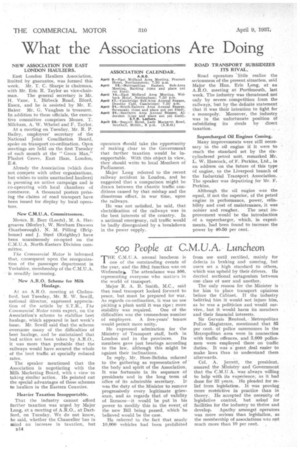What the Associations Are Doing
Page 48

If you've noticed an error in this article please click here to report it so we can fix it.
NEW ASSOCIATION FOR EAST LONDON HAULIERS.
East London Hauliers Association, limited by guarantee, was formed this week. Mr. T. C. Sharpe is chairman, with Mr. Eric R. Taylor as vice-chair man. The general secretary is Mr. 11, Vane, I, Birbeck Road, Ilford, Essex, and he is assisted by Mr. E. Baker. Mr. G. Vaughan is treasurer. In addition to these officials, the executive committee comprises Messrs. T. Mitcham, A. W. Whebel and F. Taylor.
At a meeting on Tuesday, Mr. R. P. Bailey, employers' secretary of the National Joint Conciliation Board, spoke on transport co-ordination. Open meetings are held on the first Tuesday of each month at the " Green Man," Plashet Grove, East Ham, -London, E.O.
Already the Association (which does not compete with other organizations, but wishes to unite unattached hauliers) is pursuing an active campaign and is co-operating with local chambers of commerce. A thousand posters praising the claims of road transport have been issued for display by local operators.
New C.M.U.A. Committeemen.
Messrs. R. Barr (Leeds), M. A. Hargreaves (Morley), W. Newham Dawson (Scarborough), N. M. Pilling (Brighouse) and J. Steel (Neighley) have been unanimously co-opted on the G.M.U.A. North-Eastern Division committee.
The Commercial Motor is informed that, consequent upon the reorganization of the passenger department in Yorkshire, membership of the C.M.I.J.A. is steadily increasing.
New A.R.O. Scheme for Mill( Haulage.
At an A.R.O. meeting at Chelmsford, last Tuesday, Mr. R. W. Sewill, national director, expressed appreciation of the article by S.T.R., The Commercial Motor costs expert, on the Association's scheme to stabilize beet haulage, which appeared in last week's issue. Mr. Sewill said that the scheme overcame many of the difficulties of beet haulage, and he maintained that had action not been taken by A.R.O., it was more than probable that the railways would have secured the whole . of the beet traffic at specially reduced rates.
The speaker mentioned that the Association is negotiating with the Milk Marketing Board, with a view to taking similar action. He pointed out the special advantages of these schemes to hauliers in the Eastern Counties.
Heavier Taxation Insupportable.
That the industry cannot afford further taxation was urged by Major Long, at a meeting of A.R.O., at Dartford, on Tuesday. We do not know, he said, whether the Chancellor has in mind an increase in taxation, but
1314 operators stould take the opportunity of making clear to the Government that further taxation would be insupportable. With this object in view, they should write to local Members of Parliament. • Major Long referred to the recent railway accident in London, and he suggested that a comparison might be drawn between the chaotic traffic conditions caused by that mishap and the disastrous effect, in war time, upon the railways.
He was not satisfied, he said, that electrification of the railways was in the best interests of the country. In a national emergency, rail traffic would be badly disorganized by a breakdown in the power supply. ROAD TRANSPORT SUBSIDIZES ITS RIVAL.
Road operators 'little realize the seriousness of the present situation, said Major the Hon. Eric Long, at an A.R.O. meeting at Poramouth, last week. The industry was threatened not only by severe competition from the railways, but by the definite statement that it was their intention to fight for a monopoly. Moreover, the industry was in the unfortunate position of subsidizing its rivals by direct taxation.
Supercharged Oil Engines Coming.
Many improvements were still necessary in the oil engine if it were to reach the standard set by the sixcylinclerect petrol unit, remarked Mr. L. W. Hancock, of F. Perkins, Ltd., in an address on the future of this type of engine, to the Liverpool branch of the Industrial Transport Association. The speaker was deputizing for Mr. P. Perkins, Although the oil engine was the equal, if not the superior, of the petrol engine in performance, power, reliability and cost of maintenance, it was
noisier and rougher. The next improvement would be the introduction of a supercharger, which, in experiments, had been found to increase the power by 40-50 per cent.




















































































